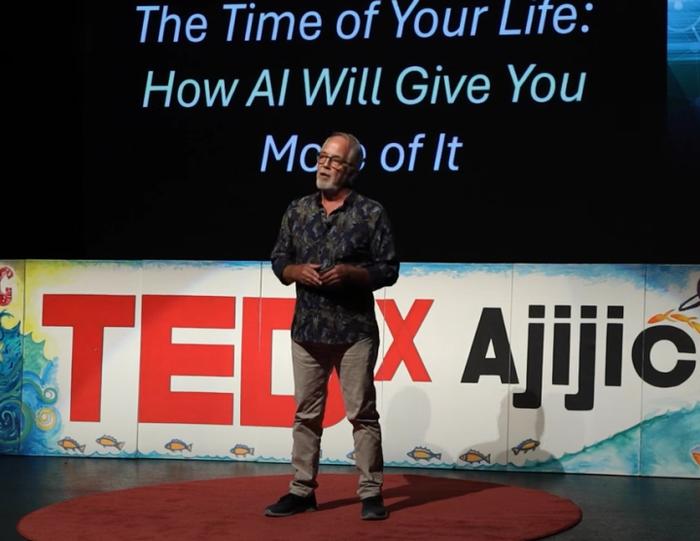One of the Paradoxes of Retirement: Shifting from Time Scarcity to Time Affluence

For most of my working life, my time was a scarce commodity. Every day I tried to juggle my life between my extensive work demands and family obligations. I tried desperately to squeeze in everything I could and was continually wishing for a day when I would have enough time to do everything I wanted to.
Back then, everyone was trying to balance their lives between work and home. So much so this resulted in work life balance becoming a major discussion point between many employees and employers.
But it's funny how life seems to always take a turn.
As we transition into retirement, a striking shift starts to occur; we begin to move from a life of time scarcity to one of time affluence. While this change may seem like a dream come true, our new time reality can often be more complicated than that.
Time Affluence: A Double-Edged Sword
Time affluence refers to the feeling of having enough—or even an abundance—of time to do what you would like to do. It’s the opposite of time scarcity, which is often associated with stress, burnout, and a constant feeling of being behind.
When we retire, we are likely no longer bound by our daily work grind and believe we will finally have the chance to pursue all the things that we have talked about. Whether it’s a passion that went dormant, a hobby we have abandoned, the travel we have always wanted to do or finally having the time to spend with our loved ones – we often see retirement as finally having the time to do this.
Our excuse of not having enough time suddenly just melts away.
Yet, for many people, the sudden freedom of retirement brings many unexpected challenges. Some may discover the same structure that once felt oppressed actually provided a sense of purpose and identity. Without having this, their days can start to blur together, and many people experience this extra time as if they are sailing without a rutter. They have no sense of direction. As a result, the hours can just flit past leaving us without having any real feeling of accomplishment or contribution.
The Identity Crisis of Retirement
One of contributors to this situation for many people is often their loss of professional identity. In retirement, they can often find themselves scrambling as to how to answer people when they ask, “So, what do you do?” and may often fall back into talking about their past working lives and successes before they retired.
So even though time may now no longer be the challenge, this loss of identity and purpose can lead to feelings of aimlessness or even depression and send them to a place where they are at a loss of what to do with their time now that they no longer have their constant work demands.
The Myth of Unlimited Leisure
Another challenge is the assumption that more leisure automatically equals more happiness. While some relaxation and recreation are important and can improve our overall happiness, a life of endless leisure can quickly lose its appeal.
As humans, we are wired for growth, contribution, and purpose. We thrive when we’re engaged in activities that challenge us, connect us to others, and make a difference—qualities not always found in continuous passive leisure.
But when we’re retired, the absence of deadlines and obligations can lead us to stagnate. With no pressing need to get up at a certain time or be anywhere specific, it’s easy to procrastinate or drift as we watch each day pass us by.
Even though we may have great plans on what we would like to do, it becomes easy to just kick the can down the road with an “I’ll do it tomorrow” mentality. There is no one now forcing us to meet any specific targets or deadlines and we may not have the personal discipline or ability to hold ourselves accountable on our own. We may even compound our thinking with “I’m retired” so there is no urgency. But this can then leave us at the end of the day wondering what we actually accomplished in the time we had been given.
So even though we initially considered having all this time as being a blessing, it can unfortunately now become a burden. And in its own strange way, can be just as demanding for us to try to productively fill this time ourselves rather than having it filled by others demands of us.
Reframing Time and Purpose in Retirement
As much as I’ve highlighted some of the downsides of time affluence, there are some amazing positives that this additional time can give to us.
Successfully navigating the shift from time scarcity to time affluence requires a conscious reorientation. It’s not enough to simply just have the time; we need to fill this time with activities that are meaningful and aligned with our values and interests.
One possible way to approach this is to view retirement not as an ending of something but as a new start to something else. If we can shift our thinking from what we were in our working lives to what we can now be we may be able to open a whole new perspective that is not necessarily burdened by our past.
Whether it’s part-time work, volunteering, mentoring, pursuing a long lost interest or being the best friend or grandparent we could possibly be, the trick is to identify things and activities in our lives that will bring us joy, energy, connection and a sense of contribution.
Also, as much we may be excited about living our days in retirement without time constraints, it’s been discovered that creating structure can be helpful. When we establish regular routines, it can help improve our mental health and reduce our overall stress along with creating a sense of accomplishment for the things that we get done.
The Opportunity of Time Affluence
As a result of our increased longevity and health, our retirement can be an amazing opportunity filled with renewal and reinvention. Ultimately, the shift from time constraints to time affluence offers us an extraordinary opportunity that many generations before us never had.
But we must be aware that to get the biggest impact from our newfound time affluence, it's not about having the flexibility to just do nothing. It’s about doing more of what matters to us. If we can embrace this, we have the potential to find our retirement life to be rich, vibrant, and purposeful – and possibly even be the best time of our lives!
Related content







